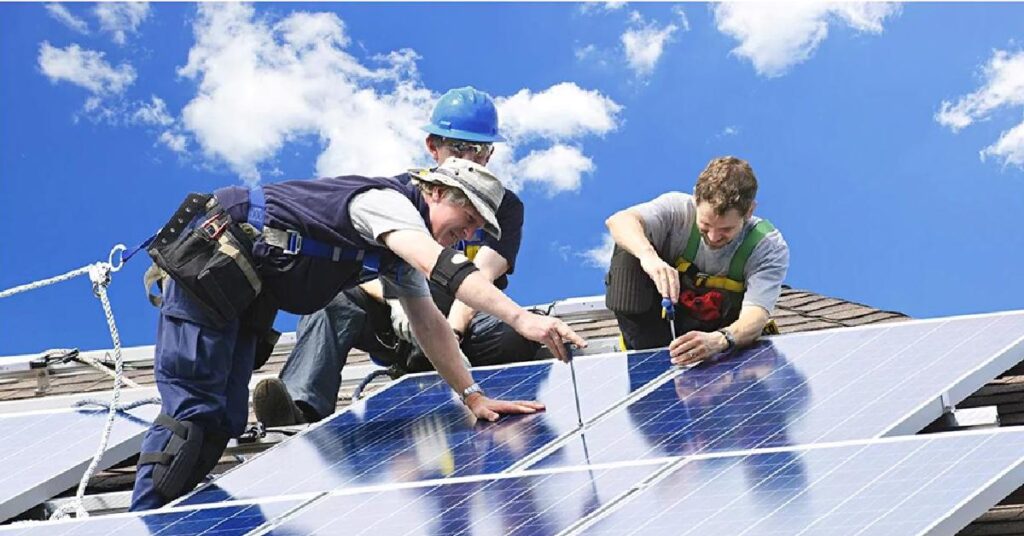The demand of solar energy has massively grown in all business facilities in the last few years. Solar installation is helpful for B2B financing and provides cost-effective energy solutions. However, selecting the right solar installer is noteworthy for businesses. A variety of options and different navigation slightly simplify the choosing process. Therefore, in this blog post, you may learn some guidance on choosing a solar installer to finance B2B.
The right finance solution for B2B solar installers reduces their carbon footprints andand overall costs. A reliable set of solar installers is about more than just the latest designs. It also demands support, monitoring services, and, of course, regular maintenance. Let’s explore some necessary points while choosing seamless transmission financing and no credit check.
Critical elements of choosing the right solar installer for B2B finance:
1. Experience and Expertise:
While looking for potential accessibility of solar installers, it’s essential to watch out for their experience in the field and expertise. Finding a goods installer with valuable track records in commercial projects, project scale, and complexity should be considered. Furthermore, experiences and certifications are essential, and affiliations with prominent industrial organizations are a pulse point.
2. References and Reputation:
A solar installer with a good track record, reputation, and numerous satisfied clients is ideal. They are researching testimonials of satisfied customers or clients, especially those who have a background in the B2B finance sector. In today’s world, online preference is also considered. Therefore, online reviews and ratings can also give you insight into the product, including professionalism, honesty, and expertise.
3. Customized Solutions:
All the businesses have some exclusive energy, operational pressures and commercial targets. A reliable solar installer should offer solutions with high-quality panels tailored explicitly to the requirements. They should only fit some people in one-size-fits; this approach can be hurtful in the long term. Understanding the business dynamics and objectives and providing solutions is their foremost duty.
4. Financial Stability:
Solar installers’ financial stability while partnering can be tricky, especially for those engaged with B2B finances. This indicates that solar installers should offer high-quality solar panels, honour warranties, and provide ongoing support. Despite this, they should remain in B2B finance during the solar project’s term.
5. Permitting and Compliance:
New solar installers may find the perplexity of permits, regulations, and incentives challenging. An experienced installer understands zoning, building local codes, introducing incentive programs, and working on other utility requirements.
Arranging an installer who can handle your business’s canal permitting and compliance documentation is the perfect choice. In addition, they are members of the Board of Certified Energy.
6. Product and Component Quality:
The quality of the inverters, mounting hardware, and other parts used in your solar system can significantly impact its longevity, performance, and durability.
Select a solar installation that collaborates with respectable producers with a track record of creating dependable, high-quality items. Find out the guarantees and warranties for the installation artistry and the equipment.
7. Energy Monitoring and Maintenance:
To get the most out of your solar system and extend its lifespan, you must undertake efficient monitoring and maintenance.
Finding out how the installation plans to track energy production, spot possible problems, and arrange for regular maintenance visits. Proactive maintenance can guarantee maximum system efficiency and help avoid expensive downtime.
Types of Solar installer to finance B2B:
- Off-grid Solar Installer
- Grid-tied Solar system
- Hybrid Solar installer
- Solar installer with water heating system
- Solar PV installer with Battery Storage
- Concentrated Solar Power (CSP) System:
Every type of solar installer has advantages and applications. Despite this, it is essential to be careful while managing budget, energy, and other site conditions. Choosing the right solar installer to finance B2B or for a home needs qualified professionals to make the right decision.
Some Tips To Pick The Right Solar Installer To Finance B2B:
- Researching all types of local solar installers
- Checking previous reviews of past projects
- Understanding the business needs and acting accordingly
- Considering various energy storage options
- Comparing the financing solutions of different products
- Estimating financing solutions
- Building customized solar solutions
- Providing quality Equipment
- Bargaining in price contract
- Analyzing ROI(Evaluating Return on Investment)
- Securing allowance and approvals
- Supervision and maintaining the solar installer
Conclusion:
In conclusion, selecting the best solar installer for finance B2B is an essential business choice. It involves reputation, customized solutions, expertise, and financial stability. Furthermore, it includes product quality, monitoring, pricing, etc.
B2B finance can choose the most beneficial installer that fits the business and contributes to a sustainable purchase.
Frequently Asked Questions:
1. What are the costs of solar installers?
The direct cost of solar installers depends on various factors, including labor costs, sizes, equipment quality, and area—however, an average-sized solar panel costs between $1 and $4 per watt.
2. What options should we look for in solar installers to finance B2B?
Options like leasing agreements, Power purchase agreements (PPAS), solar loans, and tax credits are included.
3. What duration does a solar installer need to be installed?
The duration to installing a solar panel varies upon different factors. Depending on its size and complexity, Small—to medium-sized commercial installations can take a few weeks to several months, depending on the quantity of labor.
4. Give some maintenance options for commercial solar systems?
Regular inspection, further cleaning, and low maintenance are necessary for a solar system. Proper attention can increase its lifespan and efficiency.
5. How can the quality of solar equipment and solar panels be checked?
Performance ratings, panel efficiency, warranties, and reputations are quality indicators. Further, it includes temperature coefficient, low-light performance, certification, reliability, and some industrial standards.








